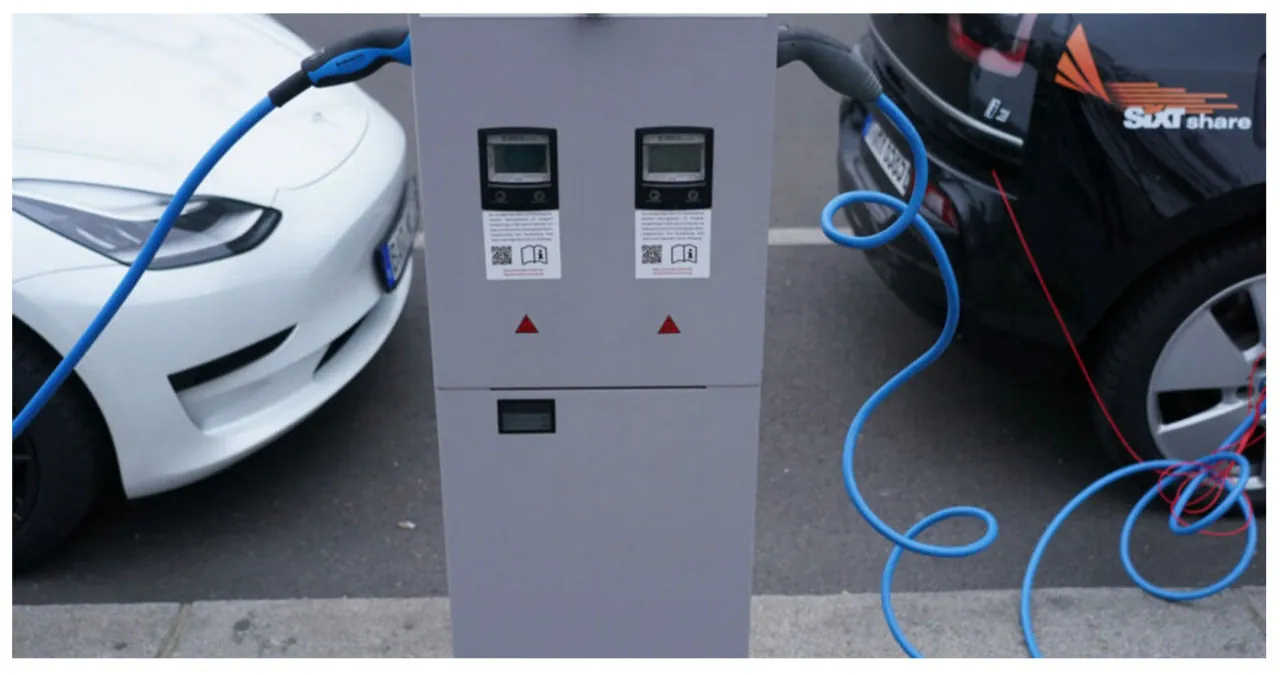The decline of the aluminum industry poses a threat to Kentucky’s clean energy supply chain just as the electric vehicle industry is poised for growth. In Berlin, Germany, electric cars are seen being charged at a public charging station (Sean Gallup/Getty Images).
Kentucky’s clean energy supply chain is at risk of being hindered at a crucial time due to the shortage of aluminum, a vital material for battery production and electric vehicles. Despite Ford Motor Co.’s plans for electric vehicle battery plants in Kentucky and Tennessee, the region’s potential as a hub for the clean energy supply chain may be compromised.
Over the past 30 years, the United States has witnessed a significant decline in its primary aluminum production, going from being the global leader to now only accounting for 1.2% of the annual production. In 1980, the country boasted around 30 smelters, but today, there are only five remaining, with two of them located in Kentucky – Century Aluminum’s Hawesville and Sebree plants. Unfortunately, the Hawesville smelter has been idle since June 2022 and has yet to resume operations. Additionally, Magnitude 7 Metals recently announced that it would be scaling back its smelter in Missouri.
Every closure, curtailment, and idling is a devastating blow.
The Inflation Reduction Act, which was approved by Congress in 2022, has sparked a surge in domestic manufacturing investment in Kentucky. Over the past year, numerous manufacturers have revealed plans to establish new battery and EV manufacturing plants, resulting in the creation of 9,000 jobs and attracting a total of $9 billion in investments. It is worth noting that the production of clean energy components demands a significant amount of aluminum, surpassing the current domestic production capacity of the United States. Given the critical importance of this industry, why are we allowing it to decline?
In the United States, a staggering 80% of primary aluminum is imported, which poses a significant risk for clean energy manufacturers in Kentucky. This reliance on imported aluminum puts local businesses at a disadvantage when competing with global rivals. It is crucial for our leaders to recognize the immense potential for economic growth and the creation of sustainable jobs within our own state.
Kentucky’s heavy reliance on fossil fuels, which make up 93% of the state’s energy portfolio, has led to a significant increase in electricity prices for industrial customers. This surge in costs has had a detrimental impact on the primary aluminum smelting industry, as electricity is the largest expense for these facilities. In fact, Century Aluminum was forced to curtail operations at its Hawesville smelter, resulting in the loss of 600 well-paying jobs for the local community.
To ensure its survival, the primary aluminum industry in Kentucky will need to transition to clean energy sources. Over the past decade, the cost of renewable energy has dropped significantly, making it competitive with, and sometimes even cheaper than, fossil fuels. The Inflation Reduction Act (IRA) funding can serve as a lifeline for these manufacturers, helping them cope with the volatile energy prices and ensuring a steady supply of affordable renewable electricity. This funding can also support the implementation of new technologies in smelters, leading to a significant reduction in greenhouse gas emissions and sulfur dioxide pollution. However, it is crucial for federal and state policymakers and regulators to take further action and enforce the use of the best-available pollution controls to safeguard Kentucky’s air and water quality.
Both smelters, due to their outdated infrastructure and long history, have been found to have violated air and water pollution regulations. In order to rectify this, it is imperative that modern pollution control technologies and standards be implemented in both facilities. Specifically, the Hawesville plant has been at risk of violating the Clean Water Act for a significant period of time by discharging contaminated wastewater.
New federal incentives are set to assist Kentucky in catching up with the global shift towards low-carbon, clean aluminum production, which is already underway in smelters across Canada, Europe, Australia, and other nations. This transformation is being driven by customer demand. In fact, in September, leading aluminum consumers such as Ford, GM, Pepsi Co., Ball Corp., and Rivian urged the Biden administration to utilize IRA funding to revitalize and expand the industry, rather than allowing domestically produced primary aluminum to vanish.
The shift towards producing clean aluminum provides a sneak peek into the potential future of Kentucky, one that is filled with numerous clean energy jobs at renewable energy-powered facilities. The recent closure of smelters in Hawesville and Missouri should serve as a wake-up call. It is crucial for our leaders to take action and ensure that primary aluminum manufacturing continues to thrive in Western Kentucky. Failure to do so will result in the loss of these valuable opportunities.
Read More:
- Assistance Needed in Locating Individuals by New York State Police
- Trump’s flimsy arguments for remaining on the ballot in the Supreme Court

